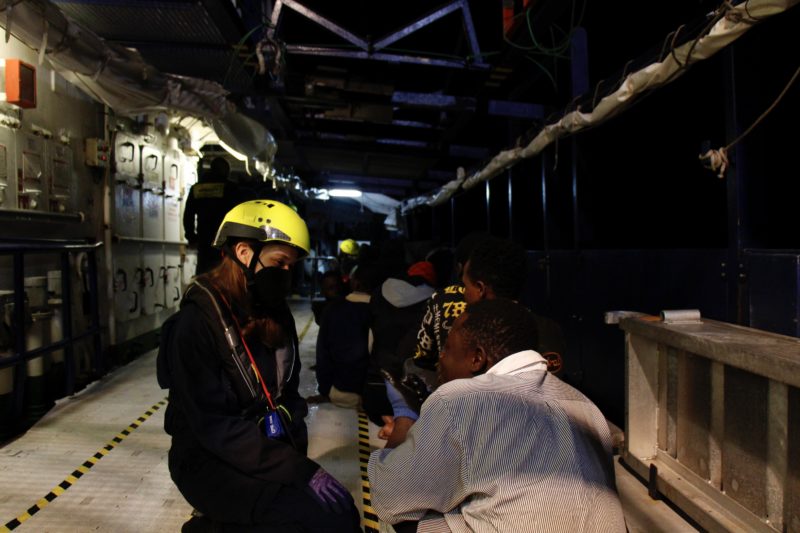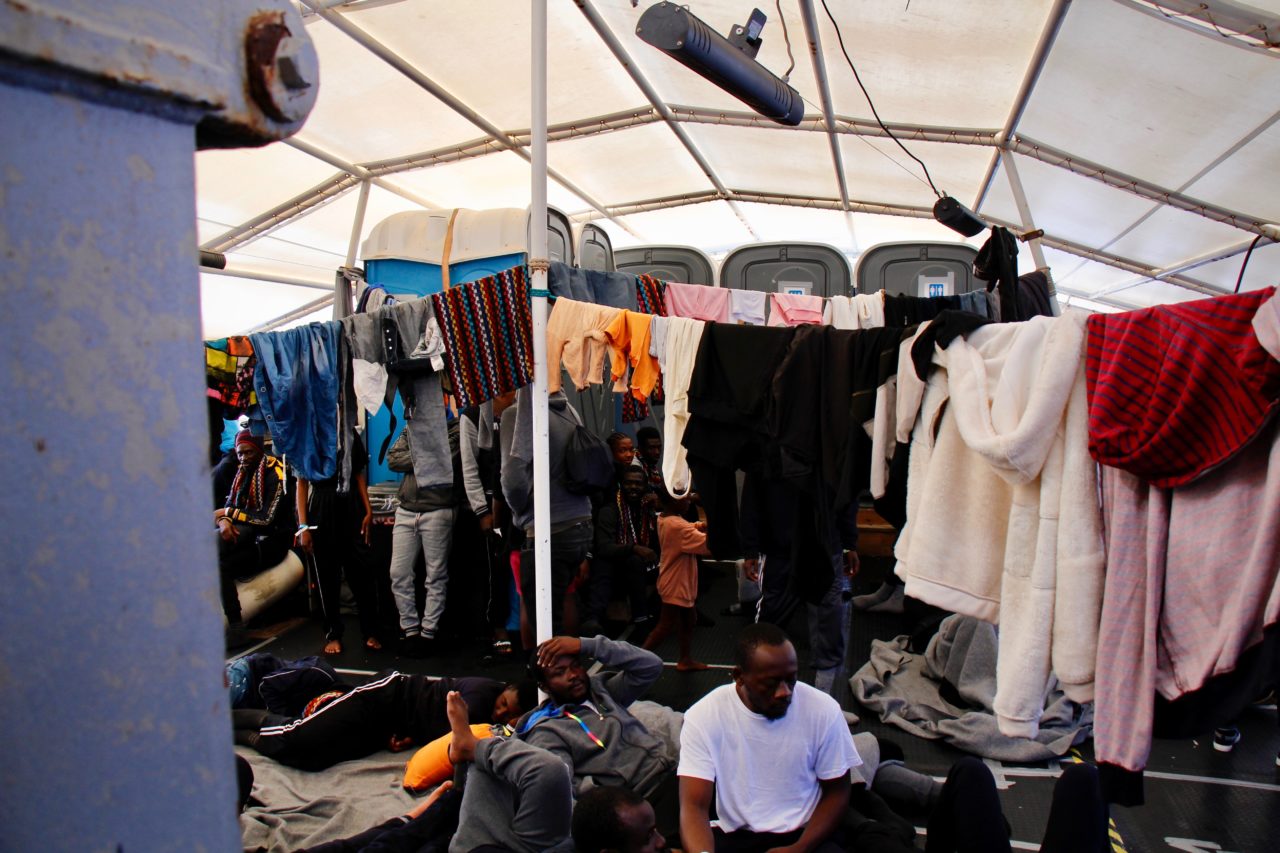Jutta describes four rescues in winter

In December, our crew was able to rescue 261 people from distress at sea in the central Mediterranean. Jutta was there as Care Coordinator and reports on her impressions on board the Humanity 1, the long journey to an assigned safe port – and those people who could not be rescued.
This article was also published in German by Focus Online on Friday, 14.04.23.
As I step onto the deck, I take a deep breath. Where we had dinner as a crew just a few days ago, people are now sitting everywhere. Rescue blankets rustle from all sides, exhausted survivors are resting on the floor. I am also exhausted from a total of four rescues. But my condition cannot be compared to what these 261 survivors had to go through during their escape across the sea. I am glad that they are now safely on board with us.
But not everyone was as fortunate as these women, children and men.
Antoine, our volunteer cultural mediator, and I gather the survivors together. Every morning, we update them and ask what they need. “Before we begin, we have something sad to tell you,” I say. I explain that during our third rescue, there was another boat with people seeking shelter nearby. “Unfortunately, only six of these people made it to us. We are incredibly sorry.” I’m glad Antoine is translating at this point because my voice breaks thinking about yesterday’s incidents. While still evacuating the third maritime emergency, we had to witness the so-called Libyan Coast Guard intercepting another inflatable boat carrying refugees, and forcibly bringing the people on board. Only six brave men managed to jump into the water and swim to us. They told us that this so-called Libyan Coast Guard confiscated their belongings and beat a pregnant woman.

In Europe, we have become accustomed to the terrible news of drownings and illegal pull-backs to Libya a long time ago. Around 50 km off the Libyan coast, this reality cannot be ignored. The mood on deck is depressed. Those on board know that the desperate people on the other boat could have been them. They all know about the grave human rights violations in Libya. Most have experienced them personally.
Not all of the survivors talk about these experiences, but our volunteer medical team sees numerous wounds and scars, many of which occurred in Libya. The injuries speak of suffering, inhumanity, and sometimes resistance. The psychologist on board cannot work miracles in the short time available. But she is there for those who for whom talking helps. She also explains to people that common symptoms such as insomnia or deep depression are natural after all they have experienced while fleeing.
The freedom to determine one’s own life is an important factor for mental health. That’s why we try to give people a voice, and provide as many activities on board as the limited deck space allows. We offer language classes and gymnastics, distribute books and games, integrate people into washing plates and cups and other minor activities on deck. Every day, the survivors ask when they can finally go ashore in a safe country in Europe. But that is not in our hands. The Italian authorities decide when and where to assign a port of safety. Five days after the first rescue, we finally get the news that we are allowed to enter the port of Bari, a city in eastern Italy.
It is December, a storm is coming. Therefore, the positive news of an assigned safe harbor is clouded by the fact we still have two days of sailing ahead of us in the worst weather imaginable. The crew sees it as a form of harassment that people in need of protection are exposed to strong waves, wind and rain on an open deck for 48 hours – even though other ports in southern Italy are much closer. In the darkness, crew and survivors are trying to create at least a little protection from the water lashing over the deck with plastic sheets and ropes. I apologise to the survivors, but they smile and wave it off, accepting the cold, wet and sleeplessness of their last night on Humanity 1 without complaint.
The next day we reach the port of Bari and the survivors are finally allowed ashore. This moment is always very emotional for me. I don’t know how they will fare from here on.
There, refugees drowning in the Mediterranean, the world’s deadliest external border, is just one of many news stories. There, we have the privilege to look away, to click onwards. Yet it is our elected democracies, and thus we ourselves, who share responsibility for these human rights abuses. As long as our foreign policy is based on a closed-door policy instead of solidarity, people fleeing will drown in the Mediterranean or be forcibly returned to inhumane Libyan detention camps. They are deprived of their human rights – the right to life, the right to safety, and the right to apply for asylum. This is the daily reality in the Mediterranean. With the help of donations from civil society, we at SOS Humanity are trying to bring a little more humanity to the Mediterranean.


